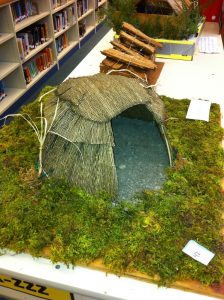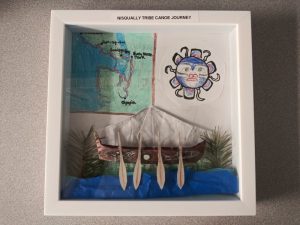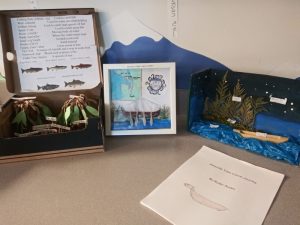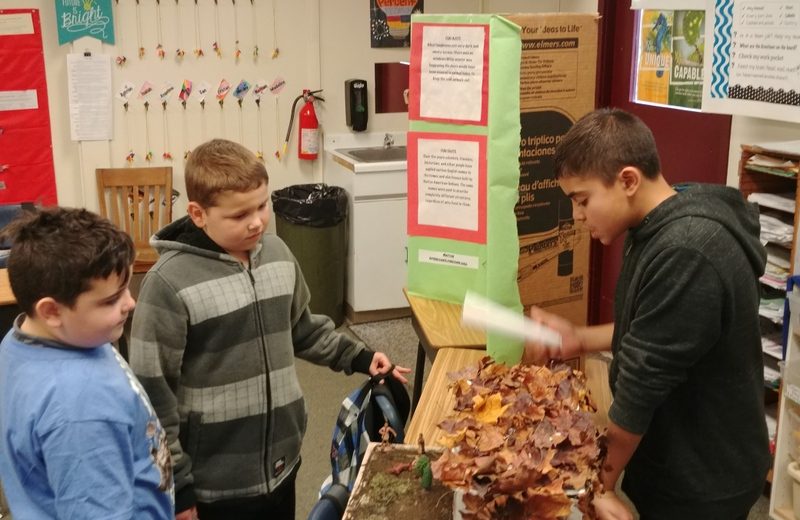On the first day of class last fall, a number of seventh graders had a pressing question for Yelm Middle School history teacher Cody Colt: When would they get to do the Nisqually Project?
 Such enthusiasm for schoolwork may seem unusual, but the Nisqually Project is not your typical assignment. Each year every seventh-grade student in the Yelm School District tackles the project, engaging in five essential questions about the Nisqually Tribe as part of their Pacific Northwest History class. After extensive research, visits from Nisqually Tribal members, and outings to the Nisqually Culture Center and other important sites, they create a written and tactile representation of their knowledge through drawings, canoe or longhouse replicas, and more.
Such enthusiasm for schoolwork may seem unusual, but the Nisqually Project is not your typical assignment. Each year every seventh-grade student in the Yelm School District tackles the project, engaging in five essential questions about the Nisqually Tribe as part of their Pacific Northwest History class. After extensive research, visits from Nisqually Tribal members, and outings to the Nisqually Culture Center and other important sites, they create a written and tactile representation of their knowledge through drawings, canoe or longhouse replicas, and more.
“You have kids who you may not see engaged the rest of the year that are engaged with that project,” says Colt. “They have a direct connection to it. With history, any time you can link it with real life, they’re going to be more involved and that’s why it’s so successful.”
The project is part of the Since Time Immemorial (STI), a statewide initiative to support the teaching of tribal sovereignty, tribal history, and current tribal issues within the context of Washington and U.S. History. All 29 tribes have endorsed the curriculum’s use and importance, yet although it’s a mandatory requirement through the Office of the Superintendent of Public Instruction (OSPI), not all districts implement it – or are even aware of the mandate.

But then there’s Yelm. Even before STI was signed into law in 2005, the district was already working with the Nisqually Tribe to incorporate tribal perspectives into history classes. Former Ridgeline Middle School teacher Jerry Price, now Social Studies Program Supervisor for OSPI, was instrumental in developing STI’s middle school curriculum. As a result, Yelm Community Schools offers an effective model for how to collaboratively develop a regionally appropriate framework that includes the history and culture of each distinct tribal nation.
Students, staff, and even parents have responded positively to the approach. For native students, the curriculum offers a rare chance to be seen as part of current events rather than past history. “A lot of times they don’t feel represented in what they’re learning,” says RMS student teacher Ilyana Brewer. “To have physical representations of their culture in the classroom and see it celebrated by non-native students definitely creates a higher level of engagement.”
Price sees other benefits for non-native students. “It’s just awareness,” he says. “They get to recognize things like geoducking and camas and the harvesting of cedar; that salmon aren’t just a fish, they’re a cultural norm, and why the Canoe Journey is so important. They see that native people are an ‘is,’ not a ‘was.’”
RMS history teacher Jenna Fissenden recalls one non-native student who began volunteering for the annual Canoe Journey after participating in the Nisqually Project. “I ran into him a couple of years later and he said, ‘Hey, Ms. Fiss, I still volunteer,’” she says. “They just find it to be such an impactful thing in their lives. They meet friends and build community.”

Parents also respond positively, according to YMS History teacher Stacy Roe. He grew up in Yelm and has been teaching there for more than 30 years. “I was brought up in this community,” says Roe. “When parents come in for conferences, a lot of them say, ‘I wish we’d had this when we were in school.’ I’ve heard nothing but positives from the people I went to school with.”
During conferences, parents and other students have an opportunity to vote on the 10 best Nisqually Projects. The chosen students then spend a day visiting every elementary school in the district and presenting their projects to fourth graders who are also studying Washington State History, hence the first day of school questions for Colt. “This was the first year that I had kids in my seventh grade class who we had presented to three years ago,” says Colt. “It makes them look forward to the project when they get to middle school. They hope to be one of the people who win the contest and get to present.”
While the Yelm District’s approach has proven highly effective, it requires commitment – and time. “It took 10 years to build those relationships,” says Price. “In a respectful model, it needs to be a district to tribe conversation. Set up those relationships where we’re going to have a year-long plan and here are some of the places where we can work together to build this community. You have to have people at the district and school level and tribal level who are willing to put in the work over time.”

He is currently working on a project for the Smithsonian’s National Museum of the American Indian.
In the future, the district is planning to restructure its curriculum so that seventh graders take one semester of Washington state history and one semester specifically focused on native culture and language. “The state only requires us to do Washington state history for half a year. We’re fortunate in this district that we get to do it for an entire year because we have such a connection with the Nisqually Tribe.”
Fissenden hopes the lasting impact on students will be an expanded awareness of the inextricable link between Native Americans and Washington and United States history, both current and modern. “You can’t understand that history completely until you understand how Native American culture has influenced every aspect of who we are as Americans and Pacific Northwesterners,” says Fissenden. “I want students to get how deeply rooted those cultural identities are. We wouldn’t be who we are today without that part of our history.”
For more information on Yelm Community Schools, visit their website or call 360-458-1900.




















































